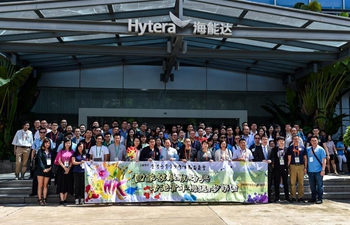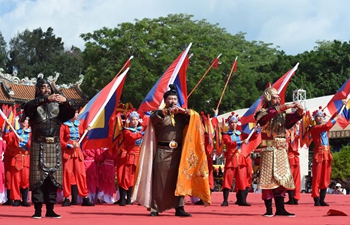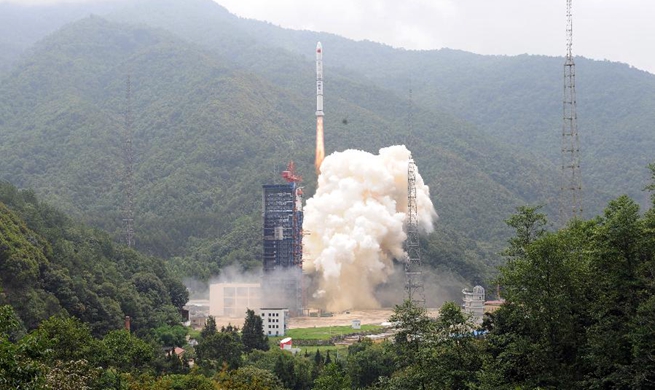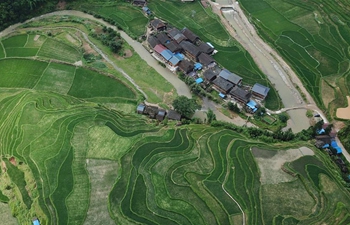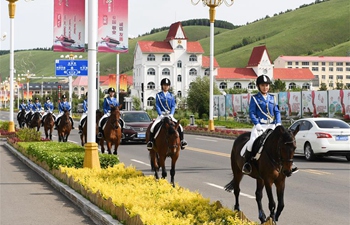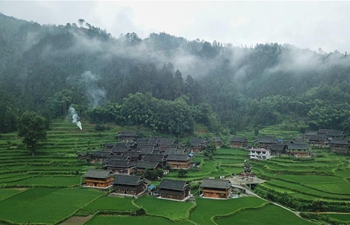BEIJING, June 27 (Xinhua) -- Guo Ziqi, a scientist who usually searches for oil and minerals deep below ground, has been helping shed light on an ancient state buried along the Silk Road.
Guo and his team from the Aerospace Information Research Institute of Chinese Academy of Sciences have been helping archaeologists explore Qiuci, which could be dated back to 2,000 years in what is today Kuqa County, in northwest China's Xinjiang Uygur Autonomous Region.
Invited by archaeologists from Xinjiang's Institute of Cultural Relics and Archaeology, they used geophysical exploration technologies to make a preliminary finding of the location, width and burial depth of the Qiuci city walls.
"When the archaeologists asked me to help look for the ancient relics by using our technologies, I initially felt it was like hitting mosquitoes with a cannon," Guo joked. "We usually use our technologies to search for resources buried deep in the Earth, so it would be much easier to look for the relics, which are comparatively very close to the surface and would display strong signals."
"I'm very interested in searching for ancient relics. I want to contribute to uncovering the mysteries of lost civilizations," he said. "But we couldn't apply geophysical exploration technologies directly to archeology. We made some adaptation."
Qiuci State was one of 36 states in the Western Regions, a term used in the Han Dynasty (202 BC to 220 AD) for areas west of Yumen Pass, including present-day Xinjiang and parts of central Asia.
Qiuci was on the ancient Silk Road and was a melting pot of Chinese, Indian, Islamic and European cultures.
During its 1,000-year period of great prosperity, it created a splendid Qiuci culture, including song and dance, music, grottoes, folk customs, arts and literature.
However, it was lost to history with almost all of the city walls destroyed by floods and human activities and most of the remains covered by modern buildings, pavements and drainage pipes, making it difficult to detect.
Archaeologists have searched for the ancient state for three years, mainly relying on historical records and a traditional Chinese tool called the Luoyang shovel to search for relics.
But the shovel cannot be used on paved roads and stony places, where Guo and his team displayed their skills to the full. They brought a ground-penetrating radar and a high-density resistivity meter.
"These two instruments complement and verify each other to confirm the existence of underground rammed earth, indicating remains of the city walls," Guo said.
The ground-penetrating radar has a high resolution and can "see" objects at the centimeter scale, while the high-density resistivity meter can detect layouts of long-buried river courses, tombs, walls and building foundations.
They found the outer city wall of Qiuci was 15 to 18 meters wide, with the widest part reaching 30 meters. Some sections were buried 2.5 meters underground.
Scientists also found the northeast corner and the southwest corner of the wall were arc-shaped instead of perpendicular.
"We also got the rough range of the ancient palace, which needs archaeologists to excavate to confirm," Guo said.
The geophysical exploration has offered scientific evidence for further research on Qiuci, and the technologies can be applied in future searches.
Guo said his team would assist Iran in exploring an ancient city along the Silk Road in July.
"I believe our methods can help make more discoveries in researching ancient civilizations of Mesopotamia and Egypt," said Guo. "Searching for lost civilizations has nothing to do with my own profession. But I believe natural science can help solve problems in humanities studies."





